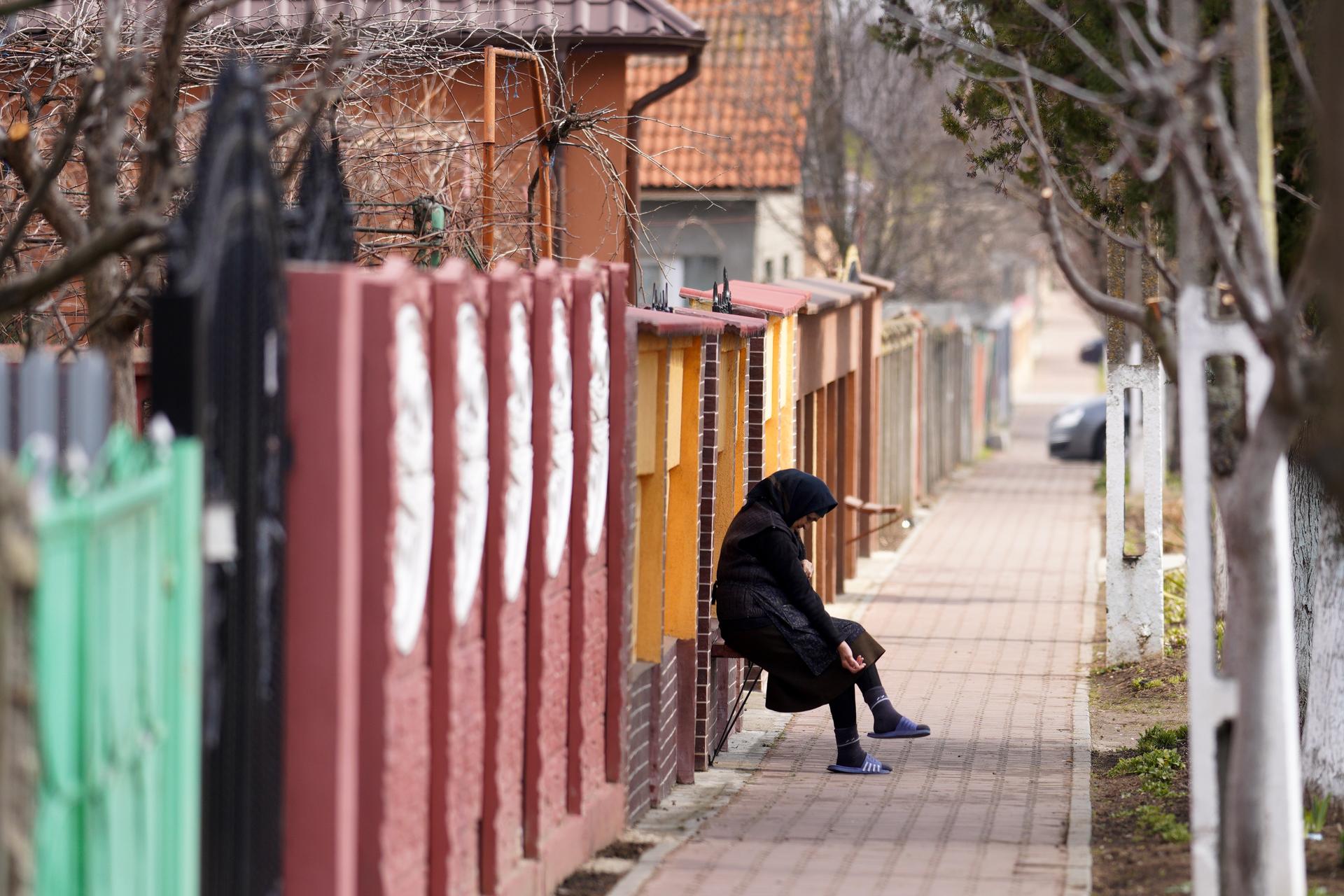Shepherd Pervu Marin watches as a flock of sheep roots for spring grasses along the roadside near the village of Deveselu, Romania.
From where he stands, he can see his home as well as the long, unmarked road leading to a NATO missile defense system off in the distance.
This site, built on a disused airfield, is designed to launch missile interceptors aimed at incoming attacks. The facility, and another one in Poland, is regularly brought up by Russian President Vladimir Putin as an example of NATO’s increasing influence in Eastern Europe.
Related: Ukrainians fleeing war are welcomed at Romania’s southern border
The attention on this tiny village in rural Romania, as a war rages in neighboring Ukraine, makes Marin uneasy.
“I’m afraid because that’s my house — it’s quite near. If they bomb us, it could fall in my garden.”
“I’m afraid because that’s my house — it’s quite near,” Marin said. “If they bomb us, it could fall in my garden.”
Marin lived through Romania’s difficult decades under Communism, and it pains him to see a neighbor fall victim to a foreign power. A part of him, he said, wishes he had the chance to meet Putin face-to-face, and give him a piece of his mind.

The Deveselu facility hosts a missile defense system known as the Aegis Ashore. Usually, these types of systems are installed atop US Navy ships, and Aegis Ashore looks quite similar: a boxy, plain, deckhouse-looking structure next to a tall enclosure used for launches.
Related: ‘We have compassion for them’: Romania is taking in thousands of Ukrainian refugees
The $800 million facility was built during the Obama administration, and was intended to intercept incoming missiles from Iran, but was named a “direct threat” by Russian officials. A similar project in Japan was scrapped in 2020 due to technical issues and ballooning costs up to $4.1 billion.
Hans Binnendijk, a senior fellow at the Atlantic Council and a former national security adviser for the Clinton administration, said he believes that the Aegis Ashore system in Deveselu is nothing that Putin needs to worry about.
“Russia has some 1,500 nuclear weapons that it could send our way — 24 missile interceptors are not going to have any impact on that,” Binnendijk said.
Putin’s fear, he said, lies in the idea that the Aegis Ashore system could be modified to shoot ballistic missiles, not just missile interceptors.
“Those modifications have not been developed. There’s no intention on our part to do it,” Binnendijk said.
The Russian government, however, doesn’t believe this. In a December editorial for Foreign Policy, Russia’s ambassador to the US, Anatoly Antonov, claimed that it’s a known fact that Aegis Ashore could be adapted to launch offensive Tomahawk strike missiles.
“When we express concern about this, we are told, in effect: ‘Just trust us,’” he wrote.
Related: Moldova struggles amid fallout from war in Ukraine
American military experts say there could be a way to deescalate the issue if delegations of Russian and NATO officials are able to inspect each other’s launch sites and confirm that they’re only outfitted for defensive use.

Until then, living next to one of these anti-ballistic missile launchers is serious business.
Like a lot of Romanian villages, the town of Deveselu is full of neat little rows of pastel-colored houses dating back to the Communist era, with well-tended gardens and orchards. It’s mostly seniors and their grandchildren who live here; many working-age adults have left for jobs in Western Europe. And these days, with the Russian invasion in Ukraine, things feel quite tense.
“To be honest, they [locals] are scared about this war. Because they think [Russia] could attack us at any time,” said Christina Alexandro, who grew up in Deveselu and returned home to visit her parents after the war started. She now lives in the UK.
Deveselu lies approximately 220 miles from the Ukrainian border, and 930 miles from Moscow. But the fear remains.
Related: Echoing WWII rescue efforts, ethnic Russian researchers in the US support Ukrainian scholars
“I hear people here talking about this, [that] we need to get ready the food, water, because we never know what will happen,” Alexandro said. “Even me, I’m a bit scared about my family because I’m not living here.”

Back in 2016, Alexandro said, many people in Deveselu were happy about the new NATO system. They were told it would bring jobs. The American government funded a new school as a part of the deal, as well.
But the missile defense site really functions outside of the community, Alexandro said. NATO personnel tend to avoid the village and spend money in a larger city nearby.
“They’re going in the city and they’re visiting, going to the restaurants and using the hotels. They’re spending there but not here. It doesn’t affect us so much, I could say.”
“They’re going in the city and they’re visiting, going to the restaurants and using the hotels. They’re spending there but not here,” Alexandro said. “It doesn’t affect us so much, I could say.”
These days, the system feels like a burden in the backyard.

Romania joined NATO in 2004 — one of many Eastern European states to do so. The country is now one of several countries bordering Ukraine that have accepted more than 3.6 million refugees in the past month, according to the UN, an exodus that hasn’t been seen in Europe since World War II.
“It’s something awful, I can’t even watch television,” said a worker named Ionel, as he took a break from patching a pothole in the road.
He asked that his last name not be used because he worked in the gardens at the missile defense facility for three years.
“If we would not be in NATO it would have been worse for us, I think. But let’s see how it will be if Ukraine will lose,” he said.
Then, he fears, Romania would be forced to face Russia directly.
Raul Stef contributed to this report.
